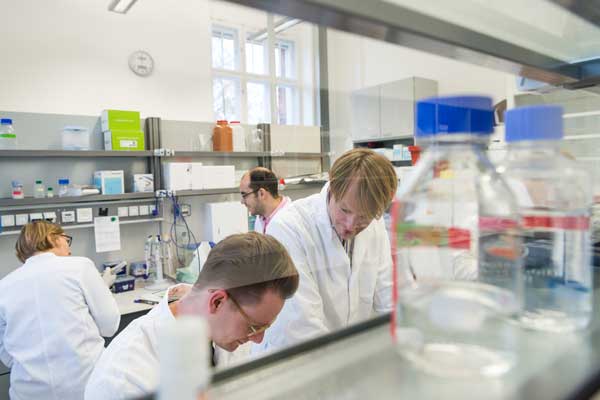Research
Our main research interest is to understand how molecular networks within cells such as signal transduction cascades or gene regulatory networks process information.
Our group uses methods from mathematical modeling, bioinformatics and quantitative cell biology to investigate how structure and dynamics of networks relate to their biological function. Specifically, the main research aim of the group is to understand how oncogenic signaling pathways and their downstream gene regulatory networks mediate their oncogenic potential, how drugs can effectively modulate these networks and how resistance against targeted kinase inhibitors arises. Other research interests include dynamics of differentiation processes, how promoters integrate different signals, and how transcriptional and post-transcriptional regulation cooperate to generate specificity and reliability in gene expression.
We work in close interplay between experiments, theory and computation.
Some of the key questions we are interested in are:
- How do cells discriminate between short and long signals? Why do chronic signals (such as induced by oncogenes) trigger other transcriptional programmes than transient signals? (see e.g. Uhlitz et al, 2017).
- What is the role of ubiquitiously found feedbacks in signalling? What are the consequences of these fedbacks for targeted inhibitors (see e.g. Klinger et al, 2013 and Fritsche-Guenther et al, 2011).
- The dose of proteins varyies strongly between individual clonal cells. How can cells deal with it? What are the mechanisms that control protein dose? (Schmiedel et al, 2015, Fritsche-Guenter et al, 2011)
To address these questions, we generate quantitative or genome-wide experimental data. We analyse and integrate these data using state-of-the-art bioinformatical methods and mathematical models.
Our infrastructure was supported by the Stiftung Charite, and the IRI Life Sciences. Our research projects are funded by the German Ministry of Education and Research (BMBF), the Deutsche Forschungsgemeinschaft (DFG), Deutsches Konsortium für translationale Krebsforschung (DKTK) and the Berlin Institute of Health through various grants.


Key publications
Spike-in enhanced phosphoproteomics uncovers synergistic signaling responses to MEK inhibition in colon cancer cells.
Nature communications, 16 (1): 4884, 2025. doi
Subcellular mRNA kinetic modeling reveals nuclear retention as rate-limiting.
Molecular Systems Biology, 20 (12): 1346—1371, 2024. doi pubmed
scPerturb: harmonized single-cell perturbation data.
Nature Methods, 2024. doi
Oncogenic signaling is coupled to colorectal cancer cell differentiation state.
Journal of Cell Biology, 222 (6), 2023. doi
Complement activation induces excessive T cell cytotoxicity in severe COVID-19.
Cell, 185: 493-512, 2022. doi
Neuroblastoma signalling models unveil combination therapies targeting feedback-mediated resistance.
PLoS Comput Biol, 17: e1009515, 2021. doi pubmed
Single-cell RNA sequencing reveals distinct tumor microenvironmental patterns in lung adenocarcinoma.
Oncogene, 40: 6748-6758, 2021. doi pubmed
Mitogen-activated protein kinase activity drives cell trajectories in colorectal cancer.
EMBO Mol Med., 13: e14123, 2021. doi pubmed
Kinetic modeling of stem cell transcriptome dynamics to identify regulatory modules of normal and disturbed neuroectodermal differentiation.
Nucleic Acids Res: 12577-12592, 2020. doi pubmed
Identifiability and experimental design in perturbation studies.
Bioinformatics, 36: i482-i489, 2020. pubmed
SPEED2: inferring upstream pathway activity from differential gene expression.
Nucleic Acids Research, 48: W307-W312, 2020. doi
Disentangling pro-mitotic signaling during cell cycle progression using time-resolved single-cell imaging.
Cell reports, 31: 107514, 2020. doi
Cell type-dependent differential activation of ERK by oncogenic KRAS in colon cancer and intestinal epithelium.
Nature communications, 10 (1): 2919, 2019. doi
The single-cell transcriptional landscape of lung carcinoid tumors.
Int J Cancer, early online, 2022. doi pubmed
Robust network inference using response logic.
Bioinformatics, 35: i634–i642, 2019. doi
Isoform-specific Ras signaling is growth factor dependent.
Molecular Biology of the Cell, 30: 1051-1128, 2019. doi pubmed
When more is less: Dual phosphorylation protects signaling off-state against overexpression.
Biophysical Journal, 115: 1383-1392, 2018. doi
Modelling Signalling Networks from Perturbation Data.
Bioinformatics, 34: 4079-4086, 2018. doi pubmed
Perturbation-response genes reveal signaling footprints in cancer gene expression.
Nature Communications, 9: 20, 2018. doi pubmed
An immediate-late gene expression module decodes ERK signal duration.
Molecular Systems Biology, 13: 928, 2017. doi
Drug resistance mechanisms in colorectal cancer dissected with cell type-specific dynamic logic models.
Cancer Research, 77: 3364–75, 2017. doi
Signal Integration by the CYP1A1 Promoter – A Quantitative Study.
Nucleic Acids Research, 43: 5318-30, 2015. doi pubmed
MicroRNA control of protein expression noise.
Science, 348: 128-132, 2015. doi pubmed
The Two Active X Chromosomes in Female ESCs Block Exit from the Pluripotent State by Modulating the ESC Signaling Network.
Cell stem cell, 14 (2): 203-216, 2014. doi pubmed
Efficient translation initiation dictates codon usage at gene start.
Molecular Systems Biology, 9: 675, 2013. doi pubmed
Network quantification of EGFR signaling unveils potential for targeted combination therapy.
Molecular Systems Biology, 9: 673, 2013. doi pubmed
Reverse-engineering a hierarchical regulatory network downstream of oncogenic KRAS.
Molecular Systems Biology, 8: 601, 2012. doi pubmed
Spatial partitioning of the regulatory landscape of the X-inactivation centre.
Nature, 485: 381-385, 2012. doi pubmed
Strong negative feedback from Erk to Raf confers robustness to MAPK signalling.
Mol Syst Biol, 7: 489, 2011. doi pubmed
Discovering causal signaling pathways through gene expression patterns.
Nucleic Acids Research, 38: W109-W117, 2010. doi
Recurrent design patterns in the feedback regulation of the mammalian signalling network.
Mol Syst Biol, 4: 190, 2008. doi pubmed